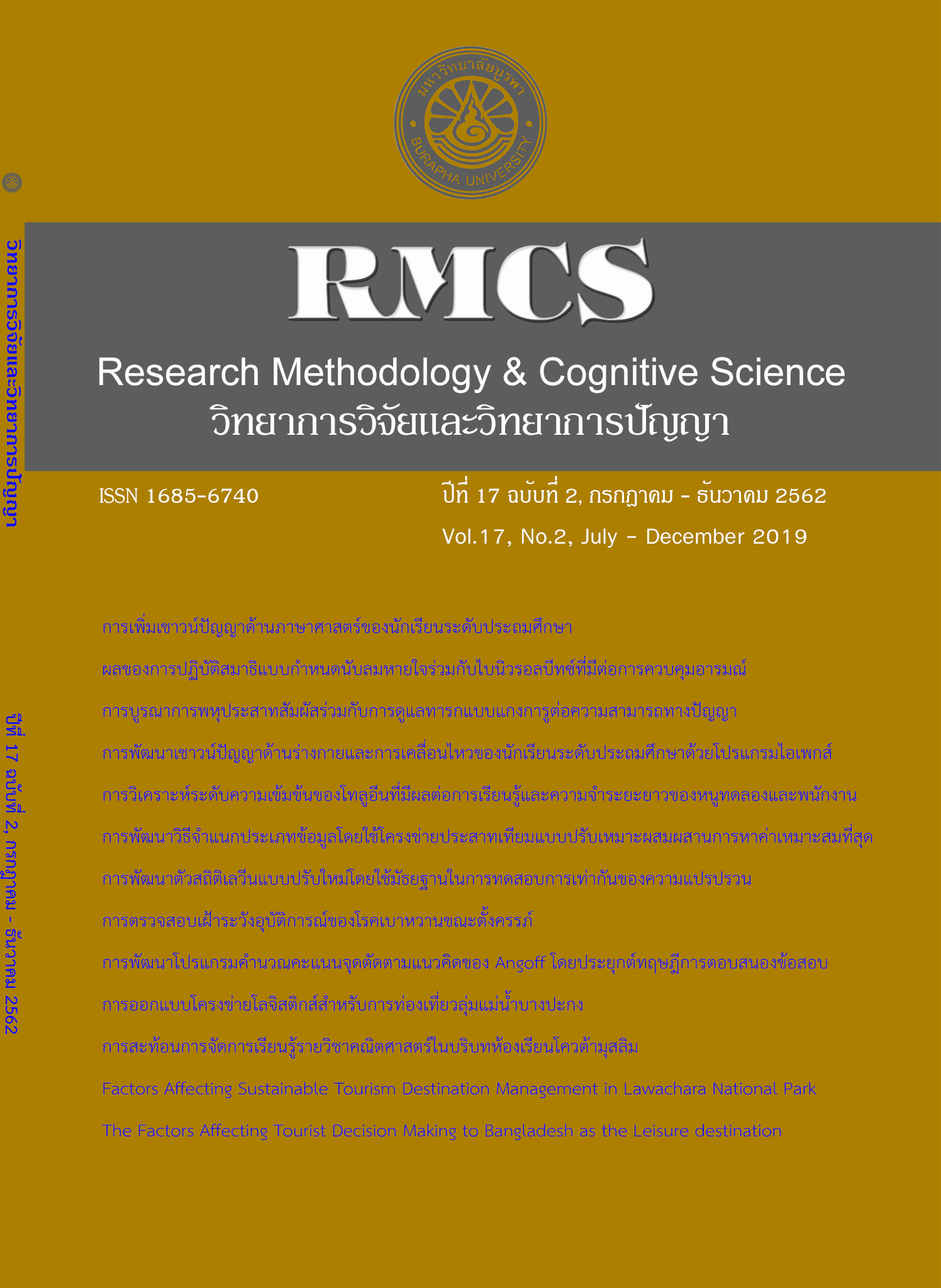Reflective Teaching of Mathematics Course in the Context of Muslim Quota Classroom at Demonstration School Prince of Songkla University
Main Article Content
Abstract
This research article aims to reflect teaching of mathematics courses in the context of Muslim quota classroom at Demonstration school, Prince of Songkla University. The target groups were 38 and 39 Mattayomsuksa 5 students in the academic year 2017-2018 with offering through the reflection cycle according to Gibbs’s (1988) guidelines. The results of the learning management which were carried out in 3 parts, namely polling, survey and basic data analysis,
it made students understood the steps or operated procedures for making polls, survey, or various descriptive statistics in the analysis of initial data as well, it also made students relaxed in learning and have had actually worked until to create infographics and to present poll results and survey results as well. The instructor analyzed that learning management in the past two years saw a variety in determining the topic of polling or survey, meanwhile the student could present topics that were area issues, such as vaccine, terrorism, Nikah (marriage) issues in school age or survey of opinions on policy issues of Green and Clean Campus, donations, or prayers, etc. However, the instructor found some problems in learning management such as problems in group work, workload of students which were offered solutions to group work problems by adding a single work option or a pair of jobs in order to be proud of their work or could do on different points of interest. As for the workload problems in other courses might had to propose to determine together or reduced excessive workloads in some courses so that students could perform in other courses equally. The instructor has planned that it will continue to perform in the above format, but could adjust the problem that reflect a weakness in the teaching process in the past two years, and think that the mathematics instructor should be able to perform in the above or similar ways to make the students have a positive attitude in mathematics, and students can also make polls or explore another ideas, leading to presentations with infographic that can communicate clearly to recipients.
Article Details
References
โรงเรียนสาธิตมหาวิทยาลัยสงขลานครินทร์. (2560). ประวัติโรงเรียน. [ออนไลน์] สืบค้นเมื่อ 6 มิถุนายน 2560 จาก http://satit.pn.psu.ac.th/website/index.php
วรรณิกา ชาญพิชญาพรวัฒน์, ภูมิพงศ์ จอมหงษ์พิพัฒน์ และเพลินพิศ ธรรมรัตน์. (2559). การพัฒนารูปแบบ
การเรียนการสอนรายวิชาคณิตศาสตร์โดยใช้เทคโนโลยีสารสนเทศเป็นฐานร่วมกับแนวคิดคอนสตรัคชั่น
นิสซึ่มเพื่อเสริมสร้างทักษะกระบวนการ และผลสัมฤทธิ์ทางการเรียนคณิตศาสตร์ของนักเรียนชั้นมัธยมศึกษาตอนปลาย. วารสารมหาวิทยาลัยนครพนม, 6(3), 106-114.
สถาบันส่งเสริมการสอนวิทยาศาสตร์และเทคโนโลยี (สสวท.).(2556). คู่มือการใช้หลักสูตรกลุ่มสาระการเรียนรู้คณิตศาสตร์ระดับมัธยมศึกษาตอนปลาย พ.ศ. 2556. กรุงเทพฯ: สถาบันส่งเสริมการสอนวิทยาศาสตร์และเทคโนโลยี (สสวท.).
สาธิต วงศ์อนันต์นนท์. (2554). การเปรียบเทียบผลโพลเลือกตั้งกับผลการเลือกตั้งจริงในวันที่ 3 กรกฎาคม 2554. สํานักวิชาการ สํานักงานเลขาธิการวุฒิสภา, 1(6), 1-15.
สุพรรณิการ์ ชนะนิล. (2560). การพัฒนากิจกรรมการเรียนรู้ของนักศึกษาครูด้วยกิจกรรมสะท้อนคิดโดยใช้รูปแบบ 3-R ในรายวิชาการวัดผลและประเมินผลทางคณิตศาสตร์.วารสารมหาวิทยาลัยราชภัฏร้อยเอ็ด, 11(2),
239-249.
อนวัช คงประเสริฐ, พูลพงศ์ สุขสว่าง และศราวิน เทพสถิตภรณ์. (2561). การเพิ่มทักษะการแก้ปัญหาทางคณิตศาสตร์ด้วยเกมคอมพิวเตอร์โมเดลแอบแตรกโคดของนักเรียนมัธยมศึกษาตอนต้น.วารสารวิชาการ แพรวากาฬสินธุ์ มหาวิทยาลัยกาฬสินธุ์, 5(3), 529-545.
อังสนา จั่นแดง และพัชรินทร เศรษฐีชัยชนะ. (2551). การใชเทคโนโลยีทางการศึกษาในวิชาคณิตศาสตร สําหรับชั้นมัธยมศึกษาตอนตน. ใน การประชุมทางวิชาการของมหาวิทยาลัยเกษตรศาสตร์ ครั้งที่ 46:
สาขาศึกษาศาสตร์ สาขามนุษยศาสตร์และสังคมศาสตร์ สาขาเศรษฐศาสตร์และบริหารธุรกิจ สาขาส่งเสริมการเกษตรและคหกรรมศาสตร์. กรุงเทพฯ: มหาวิทยาลัยเกษตรศาสตร์ วิทยาเขตบางเขน.
Automattic Inc. (2017). Difference between a poll and a survey. [Online] Retrieved on June 6, 2017 from https://crowdsignal.com/support/difference-between-a-poll-and-a-survey/
Boyd, E. M., & Fales, A. W. (1983). Reflective learning: Key to learning from experience. Journal of Humanistic Psychology, 23(2), 99-117.
Gibbs, G. (1988). Learning by doing: A guide to teaching and learning methods. Oxford, Further Education Unit Oxford Polytechnic: Oxford.
Listyono, Supardi, K. I., Hindarto, N., and Ridlo, S. (2017). Methods of integrating Islamic values in teaching biology for shaping attitude and character. International Conference on Mathematics, Science and Education 2017 (ICMSE2017), 1-6.
Lubis, M. A. (2015). Effective implementation of the integrated Islamic education. Global Journal
Al-Thaqafah (GJAT), 5(1), 59-68.
Nurkhamimi, Z. Rozhan, M. I. & Ahmad Farid, M. J. (2016). Integration of Naqli (revealed) knowledge and Aqli (rational) knowledge in postgraduate courses for open and distance learning international. Journal of Social Science and Humanity, 6(12), 939-942.
Odafe, V. U. (2007). Teaching and learning mathematics: Student reflection adds a new dimension. Proceedings of the Ninth International Conference: Mathematics Education in a Global Community, 486-490.
Osterman, K. F., & R. B. Kottkamp. (1993). Reflective practice for educators: Improving schooling through professional development. California: Corwin Press.
Schön, D. A. (1983). The reflective practitioner: How professionals think in action. Aldershot, England: Ashgate.
Siti Mistina B. M. & Effandi. Z. (2010). An exploration of mathematics teachers’ reflection on their teaching practices. Asian Social Science,6(5), 147-152.
Weisberg, H. F., Krosnick, J. A. & Bowen, B. D. (1996). An Introduction to Survey Research, Polling, and Data Analysis. 3rd edition, Sage Publication Inc, USA: California.
Yanuarti, E., & Treagust, D. F. (2015). Developing reflective teaching practices of secondary school teachers through an analysis of their lesson videotapes. International Conference on Teaching and Learning 2015, Chulalongkorn University, Bangkok – Thailand.
Zwozdiak-Myer, P. (2012). The teacher’s reflective practice handbook: Becoming an extended professional through capturing evidence-informed practice. New York, NY: Routledge.

